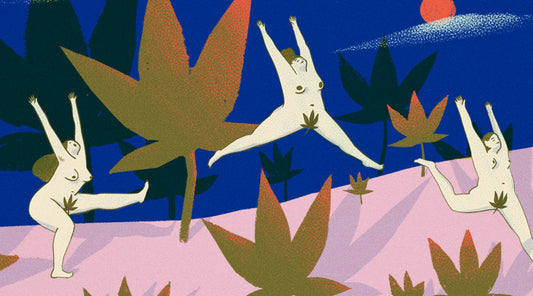Ending an abusive relationship felt like being reborn: slowly, painfully, sharp as shattered glass. My body had been rearranged, Mr. Potato Head-style, into something new, simultaneously more sensitive and blunter, more empathic but liable to shut down unexpectedly—on the sidewalk, in the bedroom, in the grocery store. Many of us, especially women and queer people, have survived some kind of sexual or intimate trauma. Our stories are unique, and all our experiences are valid. We might be sexually assaulted as an adult, or have a history of childhood sexual abuse. We might be traumatized from an experience of harassment, or from having our boundaries pushed in an unhealthy relationship. Whatever our stories, sexual trauma can change how we experience our bodies, our desires, and our sense of self. “Trauma can influence our beliefs about ourselves,” says Gretchen Blycker, a Licensed Mental Health Counselor in private practice, who teaches Human Sexuality at the University of Rhode Island. These self-image changes, in turn, can affect our sexualities, both with partners and solo, making it difficult to connect. It might not feel this way, but the reality is all of these reactions are normal ways our bodies attempt to keep us safe—remnants of the flight, fight, or freeze response that activates during traumatic experiences. It’s natural to want to hide from these intense and often painful reactions. But to truly heal and embrace our sexualities after trauma, Blycker advocates experiencing our bodies and feelings through a mindful approach. “Creating a mindful space is incredibly efficient and intuitive,” says Blycker. “It’s really accessing a person’s own inner knowing, higher self, and also the body’s wisdom.” We can choose to see the effects of trauma as an invitation to know ourselves, to honor our own resilience, and to give ourselves what we need to heal. When we understand trauma as a starting point to listen to and love ourselves, we can rediscover and deepen our profound capacity for pleasure.
Trauma Changes Our Relationships to Our Bodies
A lot of advice around connecting to pleasure after trauma focuses on communicating with new partners and exploring self-love through masturbation. Of course, communication is key to great partnered sex, and self-touch is hands down (or hands-on) the best way to build a relationship with our pleasure.
"If there's been trauma, what might be associated with sexual arousal is fear.”
But traumatic experiences can make even these healing activities difficult. That’s because trauma is a kind of physical or mental rewiring. Caught in a moment of intense threat, our bodies are flooded with adrenaline. We go into “fight, flight, or freeze” mode. Afterward, we may try desperately to figure out what happened—through, for example, obsessive thoughts about the traumatic event—and become over-vigilant, responding to anything that reminds us of the trauma by feeling stuck or immobile, having flashbacks, or even dissociating. At the same time, being treated with disrespect can make us internalize negative beliefs about ourselves and our own worth. We might blame ourselves for what happened, even though it’s never our fault. We may assume, even without acknowledging it, that we can’t have or don’t deserve pleasure and love. There are several ways we might see this play out in our sex lives. “For some, if there's been trauma, what might be associated with sexual arousal is fear,” says Blycker. Others, she continues, may wall ourselves off from sexuality completely. “I’ve worked with more people who are really disconnected or there’s some disassociation.”
Learn to Listen to Yourself
The first step to reclaiming our own pleasure isn’t avoiding these feelings, however painful or confusing they may be. It’s learning to gently connect with our bodies and what we’re feeling—good, bad, or complicated. Blycker advises getting into the simple habit of mindful attention. “Mindfulness is the process of observing, noting, paying attention on purpose to what is happening in the present moment,” says Blycker. That means learning to cultivate “an open, curious awareness” of what’s happening.
If we notice a trigger, we can “ground” ourselves in the present to teach our bodies that we are safe, or to strategize how to become safe.
She suggests getting into the habit of pausing, closing your eyes, and focusing on your breath. How are you feeling? How fast is your heart beating? Where are you tense? By simply noticing the new ways our bodies react to sexuality, intimacy, and daily life after trauma, we can learn what feels good and what we need to feel safe. Mindfulness can be particularly helpful for dealing with any triggers we might have. These can be different for everyone: a particular sexual position, a song, a certain kind of touch. Suddenly, our vision spins; our heart beats fast and breath goes ragged; we may feel like we’re outside our bodies. “Sometimes if someone is triggered or flooded, it’s hard to find language to describe what they want or what’s happening,” says Blycker. To help us through moments like this, Blycker encourages trauma survivors to practice self-awareness. If we notice a trigger, we can “ground” ourselves in the present—the painting on a wall, a song drifting in through the window, the smell of cinnamon rolls—to teach our bodies that we are safe, or to strategize how to become safe. “It's a way to be patient and slow things down and find some language,” Blycker says. Over time, by simply tuning into our own bodies, we learn what feels bad—and more importantly, what feels fantastic. “In creating change, it’s kind of resetting the arousal template,” says Blycker. “One’s body becomes a safer home.”
Boundaries Set Us Free
Ironically, one of the things that can most free us to experience pleasure after trauma is learning to assert boundaries. “Having boundaries allows ourselves to open and feel pleasure,” Blycker says. When someone violates us, they send us the message that our boundaries don’t matter, that we don’t matter. This, in turn, can make it difficult for survivors to recognize what we truly want. “Sometimes with sexual trauma, boundaries are more open or less managed, and sometimes they’re really rigid,” says Blycker. Our past experiences may have taught us that our “no” will be ignored, so we might agree to sexual experiences we don’t truly want to avoid future pain. We may build walls to protect ourselves, unintentionally keeping out experiences and relationships that give pleasure and joy. While these are totally normal reactions, Blycker says that having few boundaries or very strict boundaries can both be counter-productive. “If there are leaks in boundaries, or there have been boundaries that have been pulled in for self-protection or that haven’t been repaired, unfortunately people can be at risk for further harm and victimization.”
“I think aboutsometimes like a river: When a river has definitive boundaries, it can flow."
Rather than thinking of boundaries as a restriction or as a process of self-discipline, we can view boundaries as a process of discovery, of knowing what we don’t want so we can embrace what feels good. We can start by truly listening to ourselves, to our pain and our desire, in all aspects of our lives, not just sex. We can stay in bed once in a while when we don’t feel like going to a party; we can take a second slice of cake when we’re hungry for it. We can say no to sex when we’re tired, or let our partners bring us to orgasm without feeling the need to reciprocate. “I think about it sometimes like a river: When a river has definitive boundaries, it can flow,” says Blycker. “When we can’t identify our safe boundary, that’s a part of us that is always holding on. Or we’re overflowing, so we get hurt again.”
You Deserve Love and Pleasure
I used to feel that my post-trauma body was a burden, on both myself and partners. I was frustrated that I no longer understood my own attractions, and jealous of my friends who seemed to be having fantastic sex with ease. As I healed, those feelings didn’t all go away, but other feelings came, too: awe at my body’s sensitivity, and power in its self-protectiveness. Your body isn’t a burden. It makes sense that when we’ve had an experience that feels like drowning, we might be scared to enter the flow of our own sexualities for a while, or we might feel so vulnerable, we flood. But when we learn to love and live in our bodies, we can hold ourselves like a riverbank, and let ourselves flow.




















































